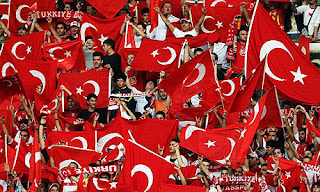Monday, July 2, 2012
Cultural Concepts of Fair Play
In the recent Anthropology News, Yağmur Nuhrat of Brown University wrestles with the concept of "fair play," drawing on her ethnographic research among Turkish soccer fans. In "Making Fairness in Turkish Football," she argues that we tend to think of fair play as defined by game rules and promoted as a celebrated ideal of "olympism" and known more colloquially, at least in the U.S., as "good sportsmanship." There is even an International Fair Play Committee that recognizes acts of fair play in "elite sports and sports for all." But Nuhrat explains how this framework is a lot more complicated than it seems. In particular, she uses the example of Alpay Özalan, a player on the Turkish national team in the 1996 Euro tournament who refused to foul a Croatian player in a crucial moment, thus winning a Fair Play award but also losing the game for his team. Fans explained bitterly to Nuhrat that "fair play" could have included a "tactical foul." Since Özalan ignored the good of the team and the nation and appeared to gain personally from it, he had not played "fairly" at all. Nuhrat concludes that "Identifying a universal right or good is but one way to approach ethics...The principles of Fair Play and Olympism ethics exist in a tenuous relationship with alternative conceptualizations of fairness. It is futile and impossible to evaluate in isolation the components of the web in which fairness is couched because it is this socially shifting web which makes fairness on the ground in concrete social sites; through the mouths and practices of football actors, be them footballers or cabbies."
While Nuhrat's piece does not address fandom specifically as a cultural construction, her analysis does present a new perspective on how fans construct the meaning of the events in which they participate, and how that may or may not coincide with the meanings that players enact or that leagues and officials attempt to institutionalize. This isn't "resistance" in the cultural studies sense of the term, but it is an example of the complex ecology of participation (to use Nuhrat's phrasing, the "socially shifting web") in any sporting event.
This is promising anthropological research for those of us who are thinking about the behaviors and values of sports audiences.
Follow-Up:
In my ignorance of Turkish names, I erroneously assumed that Yağmur was a "he." Since initially posting, I have gone back and corrected the pronouns. My apologies, Yağmur!
Subscribe to:
Post Comments (Atom)

No comments:
Post a Comment